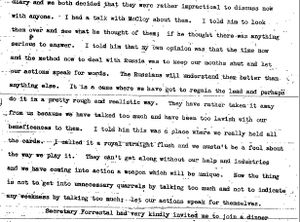War Diaries (May 14) (nonfiction)
Previous: May 13 - Next: May 15
Diaries
Isaac L. Taylor: May 14, 1863
This evening Sergts. Wm. L. Wakefield & P. H. Taylor are arrested & taken to the guard house for burning lights after "taps." Doble, Fowler & myself crawl out the back side of the tent & escape. We do not like the idea of being arrested for such light offenses, 100 Pdr. Parrott gun came in on the cars this morning. It is 13 feet long & 6 1/2 inch bore
—Isaac Lyman Taylor, Company E, First Minnesota Volunteer Infantry
Taylor kept a diary of his experiences while serving with Company E of the First Minnesota Volunteer Infantry.
Elisabeth Jacoba van Van Lohuizen-van Wielink: May 14, 1940
At 7 o’clock, suddenly an extra message on the radio, a moment I’ll never forget. The commander in chief had decided to cease all hostilities. Rotterdam was as good as destroyed by the bombardments; if they didn’t cease fighting, The Hague, Amsterdam, and Utrecht would meet the same fate. I was so overwhelmed, I wept.
We weren’t free anymore, and this, if we understood correctly, as a result of betrayal by our own people. We couldn’t believe it, yet it was true. Everyone was glad no more people would be killed, but still. To become part of Germany, how awful! What will the future bring? Poverty for our country. A heavy ordeal for everyone and an uncertain future.
—Elisabeth Jacoba van Van Lohuizen-van Wielink was a Dutch citizen who began keeping a diary immediately after the German invasion during the Second World War.
- Dutch War Diaries @ NY Times
George Beck: May 14, 1944
Nothing fresh to report. Lovely day. Played soccer in the afternoon against Neubouers party. I played right wing and we won 1 – 0. Receiving no mail from home, seem to have lost touch with everything. Roll on.
—George Beck,1st Battalion The Duke of Wellington's Regiment, prisoner of war (diary)
Henry L. Stimson: May 14, 1945

I told [John J. McCloy] that my own opinion was that the time now and the method now to deal with Russia was to keep our mouths shut and let our actions speak for words. The Russians will understand them better than anything else. It is a case where we have got to regain the lead and perhaps do it in a pretty rough and realistic way. They have rather taken it away from us because we have talked too much and have been too lavish with our beneficences to them. I told him this was a place where we really held all the cards. I called it a royal straight flush and we mustn't be a fool about the way we play it. They can't get along without our help and industries and we have coming into action a weapon which will be unique. Now the thing is not to get into unnecessary quarrels by talking too much and not to indicate any weakness by talking too much; let our actions speak for themselves.
—Henry L. Stimson (diary) - Henry Lewis Stimson (September 21, 1867 – October 20, 1950) was an American statesman, lawyer and Republican Party politician. After the United States entered World War II, Stimson took charge of raising and training 13 million soldiers and airmen, supervised the spending of a third of the nation's GDP on the Army and the Air Forces, helped formulate military strategy, and oversaw the Manhattan Project, which built the first atomic bombs.
The "weapon which will be unique" refers to the Manhattan Project.
- https://nsarchive2.gwu.edu/nukevault/ebb525-The-Atomic-Bomb-and-the-End-of-World-War-II/documents/012.pdf
- https://nsarchive2.gwu.edu/nukevault/ebb525-The-Atomic-Bomb-and-the-End-of-World-War-II/
In the News
Fiction cross-reference
Nonfiction cross-reference
- George Beck (nonfiction)
- Manhattan Project (nonfiction)
- Henry L. Stimson
- Isaac L. Taylor (nonfiction)
- Elisabeth Jacoba van Van Lohuizen-van Wielink (nonfiction)
- War (nonfiction)
- War Diaries (nonfiction)
External links
- http://collections.mnhs.org/MNHistoryMagazine/articles/25/v25i04p342-361.pdf (PDF)
- Dutch War Diaries @ NY Times
- http://www.pegasusarchive.org/pow/george_beck1.htm
- https://nsarchive2.gwu.edu/nukevault/ebb525-The-Atomic-Bomb-and-the-End-of-World-War-II/documents/012.pdf
- https://nsarchive2.gwu.edu/nukevault/ebb525-The-Atomic-Bomb-and-the-End-of-World-War-II/